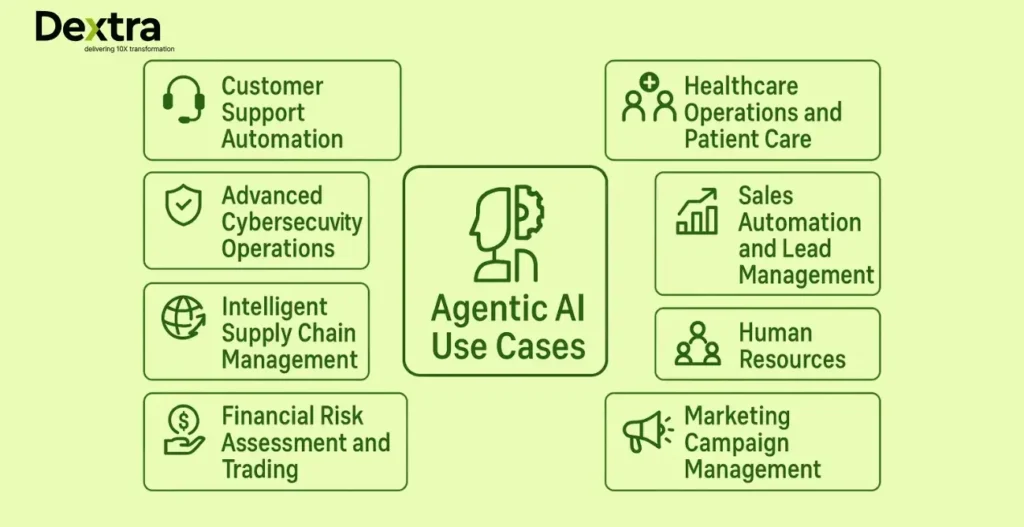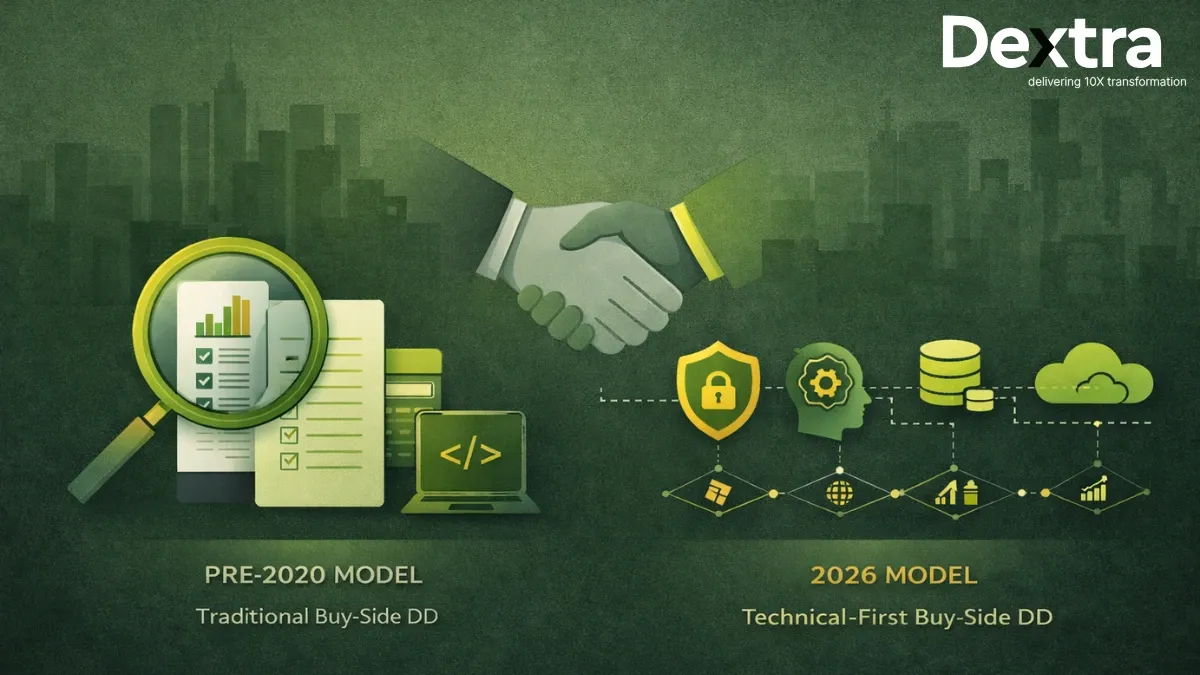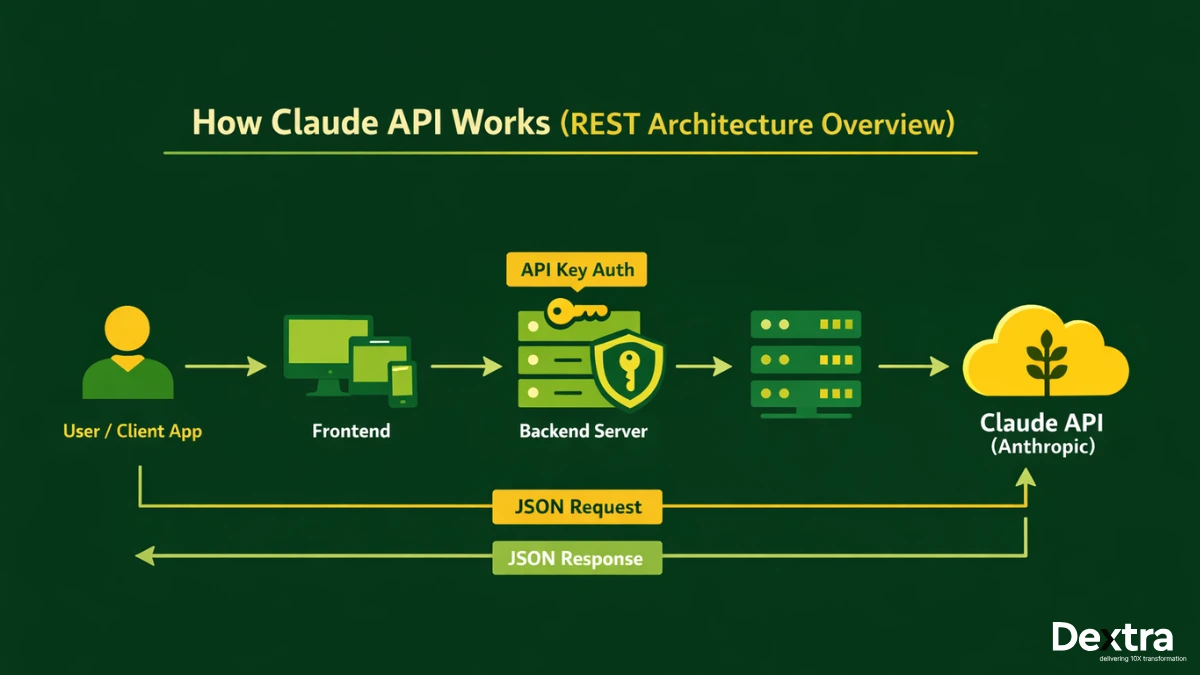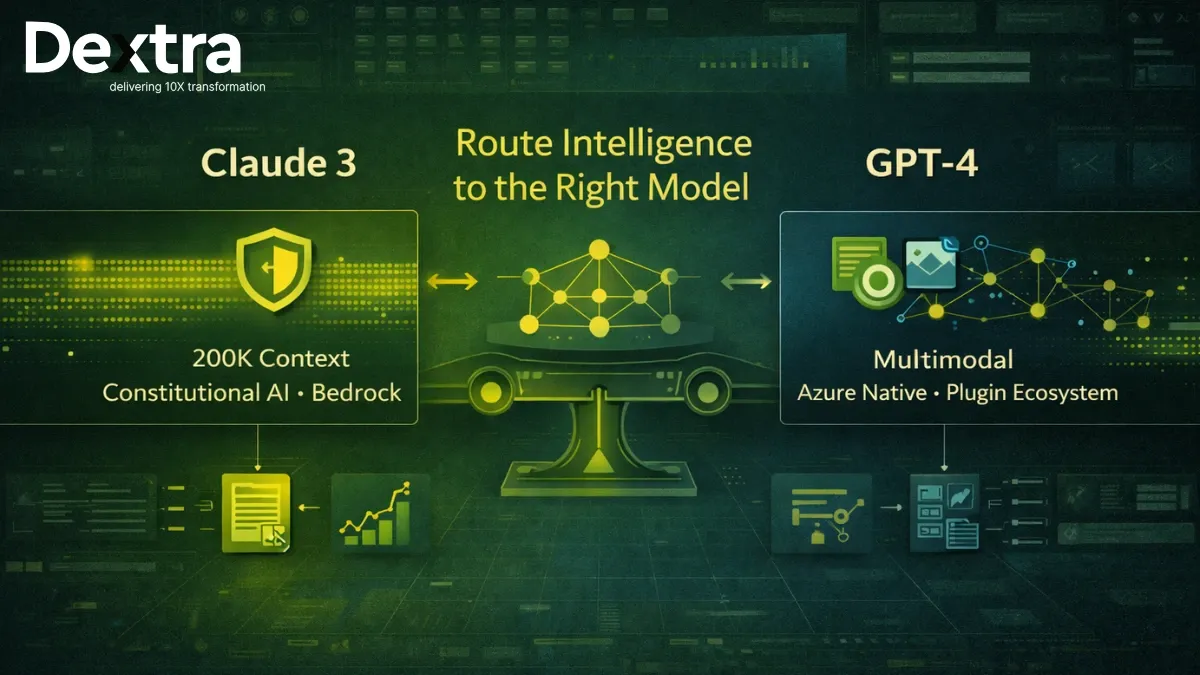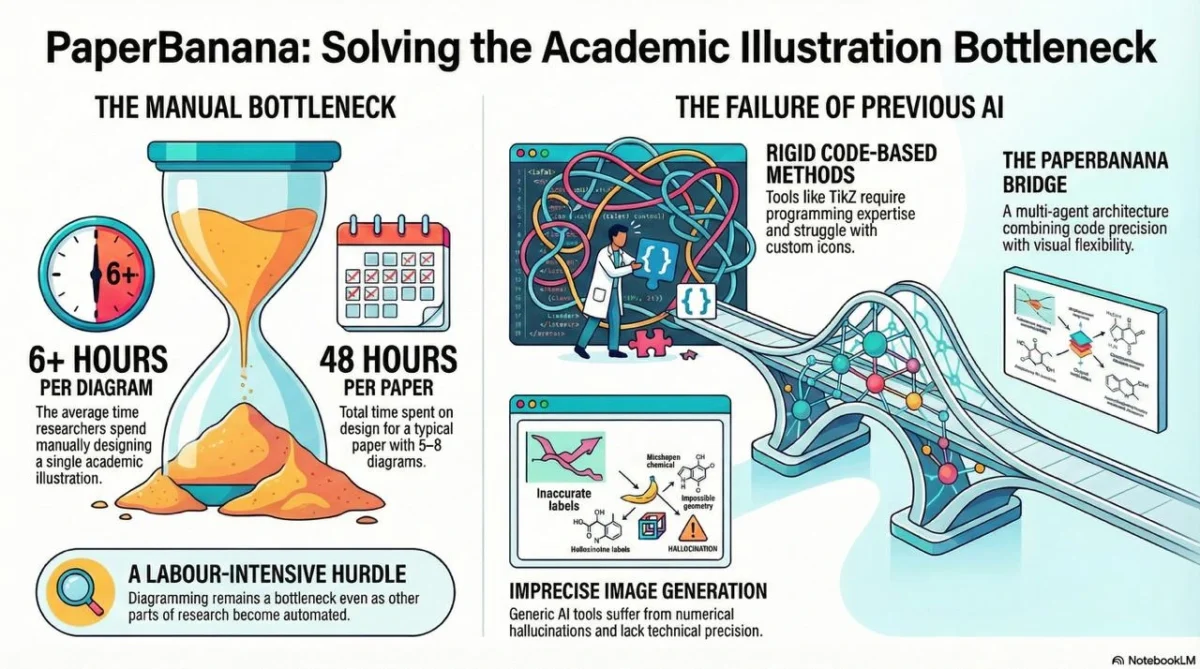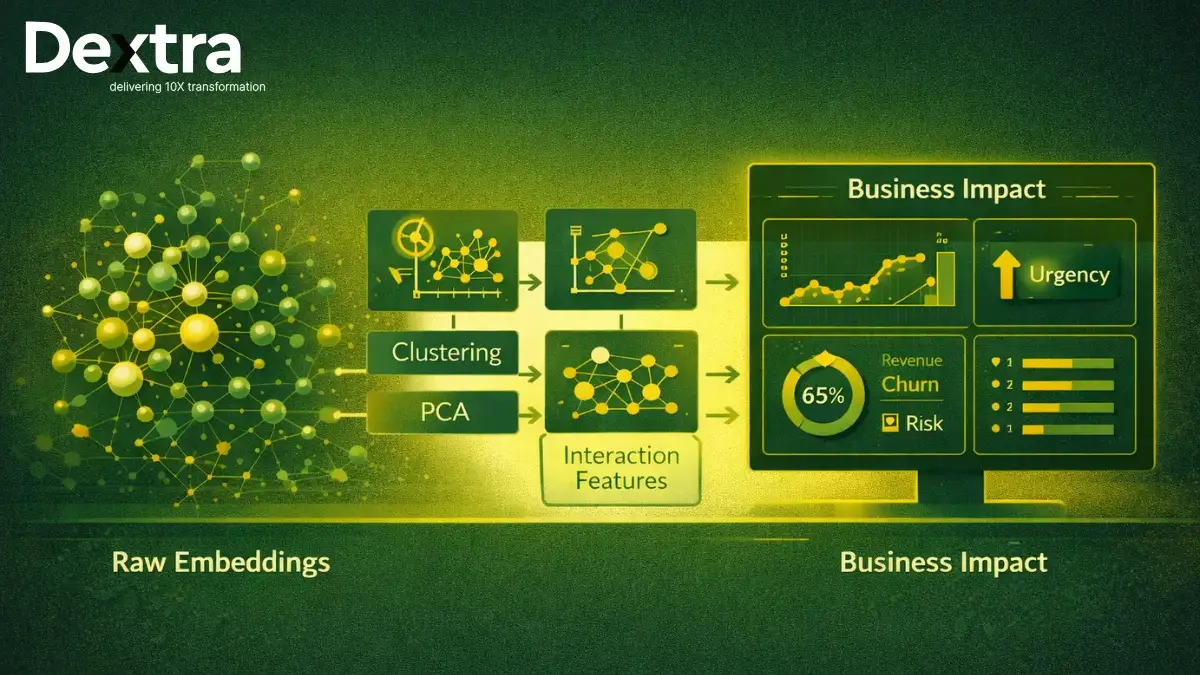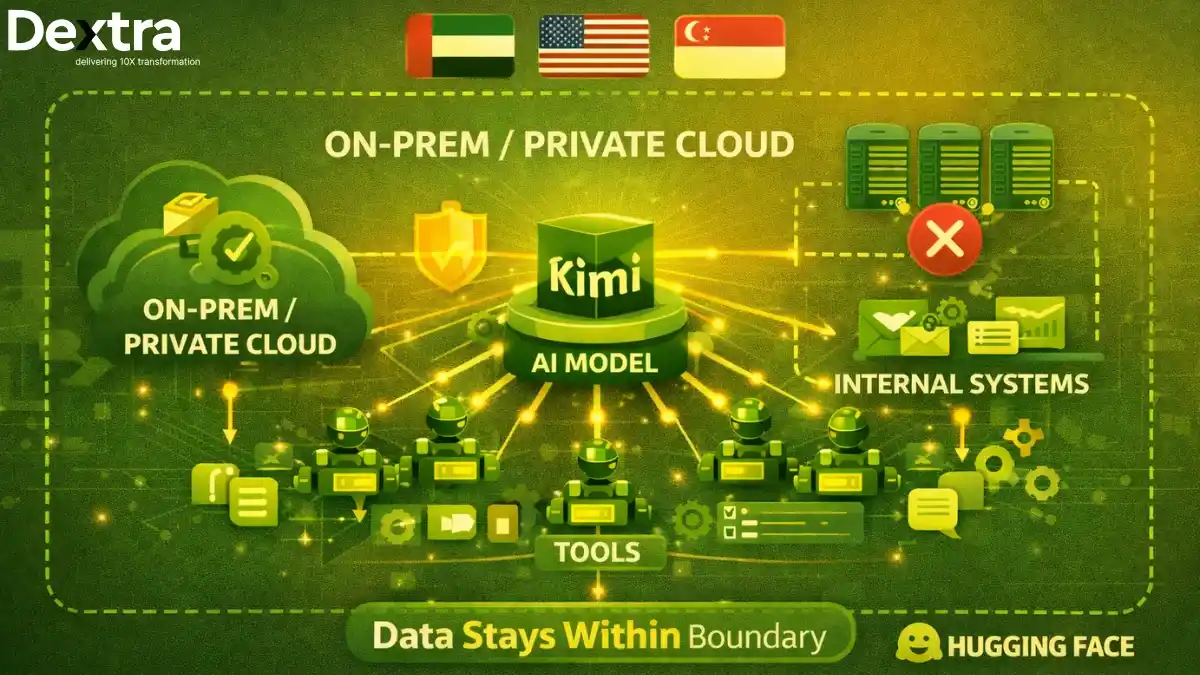Here at Dextra Labs, clients constantly ask us: “What is an AI use case” that could actually transform our business? Great question—and we’re excited to share the answer.
Agentic AI represents a revolutionary leap in artificial intelligence technology, enabling systems to operate autonomously, make real-time decisions, and adapt to changing circumstances without constant human oversight. Understanding what is an AI use case and exploring use cases of agentic AI examples has become crucial for businesses seeking competitive advantages in today’s digital landscape.
The market momentum is substantial: the Global Agentic AI Market size is expected to be worth around USD 196.6 billion by 2034, from USD 5.2 billion in 2024, growing at a CAGR of 43.8% according to Market.us research.These aren’t just fancy chatbots anymore; we’re talking about “use cases of agentic AI examples” that think, adapt, and make decisions like brilliant team members who never sleep.
From “use cases of agentic AI in healthcare” to manufacturing, we’ve helped companies implement “AI examples”that actually work. Let’s dive into the ten most impactful “use cases of agentic AI in real world” applications transforming businesses right now.
Market Growth Overview
| Year | Market Value (USD) | Growth Rate (CAGR) | Source |
| 2024 | $5.2 billion | Market.us | |
| 2034 | $196.6 billion | 43.80% | Market.us |
What Makes Agentic AI Different?
Before we get into concrete examples of AI applications, let’s go over what makes agentic AI different from the systems we have today. Agentic AI has goal-oriented behavior, autonomous decision-making capabilities, and the ability to interact with multiple tools and environments at the same time. An Agentic AI is one that isn’t just doing a complex task, but potentially a multi-step task where a key human intervention was once needed.
Top 10 Real-World Use Cases of Agentic AI
1. Customer Support Automation
The most well-known use case of agentic AI in practice is transforming the customer service process. Today’s intelligent AI agents are able to address multi-faceted customer queries seamlessly through any channel, escalate when needed, and in some cases even proactively contact customers who are facing issues.
These systems analyze conversational history and customer preferences, along with their product knowledge, to tailor support-a sort of individualized support that often exceeds a human in the aspects of speed and consistency.
Firms that have adopted agentic AI for customer support cite reductions in response time and increased customer satisfaction, with exact figures highly industry- and adoption model-specific.
2. Advanced Cybersecurity Operations
Cybersecurity is the highest-impact field in demonstrating applications of agentic AI examples with a proven track record for efficacy. These AI agents run around the clock to monitor all network traffic activity and continuously look for new patterns, automatically rolling out counter measures that help protect any organization from even new threats that haven’t been identified yet.
For two, they’re able to continuously and automatically recalibrate security protocols as new attack vectors emerge, coordinate incident response across multiple affected ecosystems, and in some instances, predict vulnerabilities before they’re ever exploited.
3. Intelligent Supply Chain Management
Supply chain optimization is one area that really exemplifies the most meaningful and even agentic AI use cases in real world applications. These systems are able to analyze demand patterns, weather conditions, geopolitical factors and other transportation data to make real-time and dynamic routing decisions.
They make automatic decisions to adjust inventory in transit between locations, reroute shipments to alternative locations when there’s a disruption, negotiate cancellations and delays with suppliers and customers to keep stock at optimal levels and costs low.
4. Financial Risk Assessment and Trading
The financial sector uses agentic AI for advanced risk management and algorithmic trading. These systems take in the current market conditions, shifting regulatory landscape, and other economic indicators to continuously inform on the best decisions for investment to make at any moment.
They can do things like automatically rebalance portfolios, execute complex trades on the basis of predetermined strategies, and raise an alert to human oversight in the event of unusual market conditions.
5. Healthcare Operations and Patient Care
Use cases of agentic AI in healthcare extend far beyond simple appointment scheduling. According to recent industry data, 90% of hospitals worldwide are expected to adopt AI agents by 2025, using them for predictive analytics and improved patient outcomes. AI agents coordinate patient care across multiple providers, monitor vital signs from wearable devices, and automatically adjust treatment protocols based on patient responses.
They’re able to forecast emerging health issues, automate medication regimens, and guide doctors in the operating room by continuously analyzing data in real-time.
6. Sales Automation and Lead Management
Agentic AI systems that can spot which potential leads are most likely to convert, personalize their outreach messages, and follow up regularly with prospects boost sales teams’ productivity immensely. These agents are fed data on customer behavior patterns, social media activity, and purchase history and help determine the best timing and messaging for sales interactions. They can intelligently trigger automation to schedule follow-ups, deliver targeted content, and even negotiate basic terms of a contract.
7. Manufacturing Process Optimization
Manufacturing is another field where use cases for AI show truly game-changing promise. Agentic AI systems track an entire production line in real-time, predicting equipment failures before they happen and automatically adjusting processes to ensure that quality standards are met. They’re more than just masters of efficiency. They can better plan maintenance needs, map out maintenance workflows, and time maintenance needs to align with suppliers to avoid interruptions in production.
8. Marketing Campaign Management
Digital marketing campaigns benefit from agentic AI’s ability to analyze customer behavior, test different messaging approaches, and automatically optimize ad spending across multiple platforms. As per Detralabs study, In 2025, 80% of marketers reported that AI tools exceeded their return on investment expectations, highlighting AI’s significant impact on marketing effectiveness and efficiency. These systems can create personalized content, adjust targeting parameters based on performance data, and even develop entirely new campaign strategies based on market trends and competitor analysis.
9. Human Resources and Talent Management
HR departments increasingly rely on agentic AI for streamlining recruitment, employee onboarding, and performance management. AI agents can screen resumes, conduct initial candidate interviews, and match job seekers with appropriate positions based on skills and cultural fit. They also monitor employee engagement, predict turnover risks, and recommend personalized development opportunities.
10. Disaster Response and Emergency Management
Emergency response represents one of the most critical use cases of agentic AI examples, where these systems coordinate multiple agencies, analyze real-time data from various sources, and make rapid deployment decisions. AI agents can predict disaster impacts, optimize resource allocation, and maintain communication networks during emergencies while continuously updating response strategies based on evolving conditions.
Industry Adoption Patterns
While comprehensive adoption statistics are still emerging, industry reports suggest varying levels of agentic AI implementation across sectors:
| Industry Sector | Implementation Focus | Primary Benefits Reported |
| Financial Services | Risk management, trading | Faster decision-making, improved risk assessment |
| Healthcare | Patient care coordination | Better care coordination, operational efficiency |
| Customer Service | Support automation | Reduced response times, improved consistency |
| Manufacturing | Process optimization | Reduced downtime, quality improvements |
| Marketing | Campaign optimization | Better targeting, improved ROI |
| Supply Chain | Logistics optimization | Cost reduction, improved efficiency |
Regional Adoption Patterns
Global adoption rates show interesting regional variations, with Asian markets leading in AI integration:
- India and China: 60% of IT professionals indicate active AI incorporation
- United States: 25% adoption rate among enterprises
- United Kingdom: 24% adoption rate
- Australia: 24% adoption rate
- South Korea: 22% adoption rate
Source: Global AI Adoption Survey 2025
Implementation Considerations
Organizations considering agentic AI implementation should focus on identifying processes that involve multiple decision points, require real-time adaptation, and benefit from continuous optimization. The most successful deployments typically combine the autonomous capabilities of agentic AI with appropriate human expertise and oversight, creating hybrid systems that deliver improved efficiency and effectiveness.
Key factors for successful implementation include:
- Clear goal definition and success metrics
- Robust data quality and governance
- Appropriate human oversight frameworks
- Continuous monitoring and adjustment capabilities
- Change management and staff training
Future Outlook
The evolution of agentic AI is more than a technological evolution; it spans the entire manner in which organizations approach complex problem-solving across industries. With systems still growing capable and accessible, those companies that intelligently integrate applications of agentic AI will, in turn, gain competitive advantage in their respective markets.
With markets projected to reach nearly $200 billion by 2034, the question is no longer if agentic AI should be adopted, but rather how organizations can successfully incorporate autonomous systems into their operations while ensuring proper oversight and an ethical framework.
Final Words
Through our experience implementing these “use cases of agentic AI” across diverse industries, we’ve observed that successful organizations share a common approach: they identify strategic opportunities where autonomous decision-making creates genuine competitive advantage. The most effective implementations aren’t necessarily those with the largest technology investments, but rather those with clear business objectives and thoughtful integration strategies.For organizations considering this technology, we recommend starting with a strategic assessment of “what is an AI use case” that aligns with your core business objectives. At Dextralabs, we partner with forward-thinking companies to transform AI possibilities into measurable business outcomes.
Ready to Build an AI-Ready Workforce?
Partner with Dextralabs to train your engineers using AI-powered learning that’s fast, personalized, and scalable.
Book Your Free AI ConsultationFAQs:
Where can agentic AI be used?
Agentic AI can be used anywhere decisions, autonomy, and goal-driven tasks are involved. Think customer service, healthcare, HR, retail, finance, logistics, and even cybersecurity—anywhere a system needs to act on its own, not just respond.
What are the use cases of agentic AI in HR?
In HR, agentic AI can handle autonomous recruitment tasks—screening resumes, scheduling interviews, and even nudging candidates. It can also monitor employee sentiment, recommend personalized learning paths, and proactively improve workplace engagement.
What is the use case of agentic AI in retail?
In retail, agentic AI can power smart inventory systems that restock on their own, personalize customer journeys in real-time, or even launch targeted campaigns automatically based on buying behavior and trends.
What is the use case of agentic AI in finance?
In finance, agentic AI can analyze risk, automate trading decisions, detect fraud, and offer personalized investment advice—all without constant human input, adapting dynamically to market changes.
What are examples of AI?
Some common examples of AI include:
Google Maps for route optimization
Netflix for content recommendations
ChatGPT for conversations and writing help
Self-driving cars like Tesla Autopilot
Facial recognition in phones and surveillance
Is Alexa an example of AI?
Yes, Alexa is an example of AI—specifically conversational AI. It uses natural language processing and machine learning to understand and respond to voice commands, play music, control smart devices, and more.
What are the 4 types of AI examples?
The 4 types of AI (based on capability) with examples:
Reactive Machines – No memory, just reacts (e.g., IBM’s Deep Blue chess computer)
Limited Memory – Remembers past data (e.g., self-driving cars)
Theory of Mind – Still experimental, aims to understand emotions and beliefs
Self-aware AI – Only theoretical as of now, where machines are conscious

